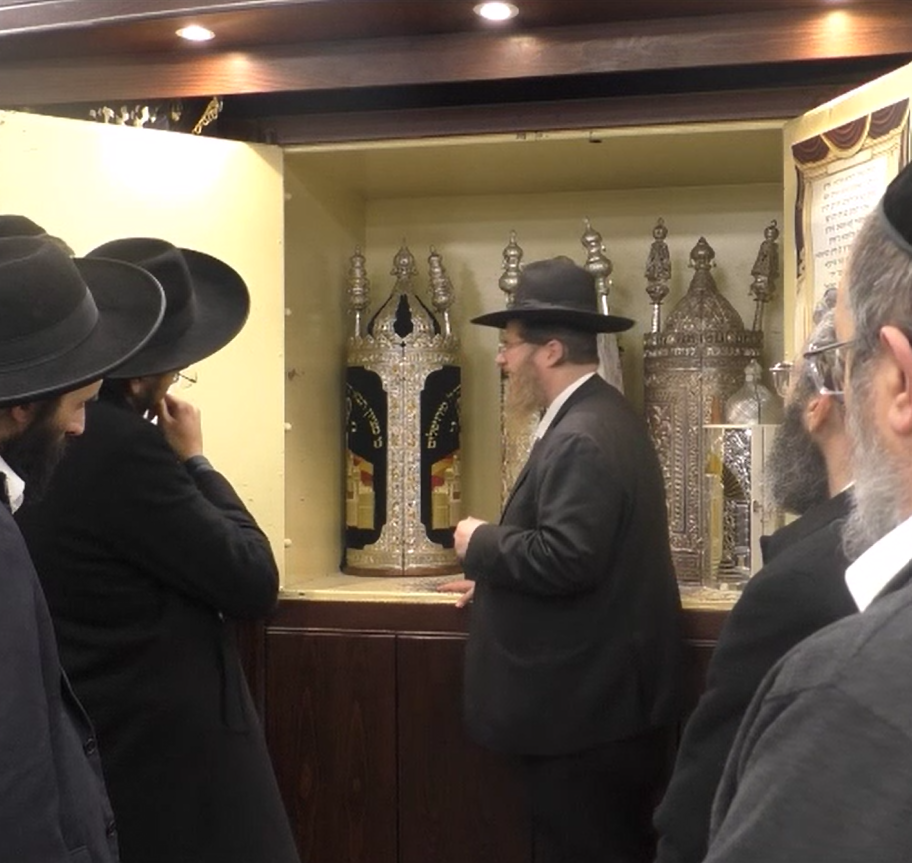
The laws of Maaser Kesafim (the Monetary Tithe)
Summary of the Tithing laws on Financial Income (Ma’asrot, Tzedakah, etc.) How much should a person donate of their profits


Hello Rabbi. I would like to know what security options exist to improve “Shalom Bait”? Urgent… Thank you.
Shalom,
In fact, there are many segulot for “Shalom Bait” (the peace at home) and for the love between a husband and his wife, but we must first say that before looking for segulot (or along with segulot), one must know that “Peace at home” depends largely on free will: working on issues, knowing how to give in, giving, acceptance, self-control, self-awareness, understanding the differences of others, reconciling expectations and objectives and values, correct management of marital dynamics (in thought, speech and action), positive outlook, mutual respect, expression of appreciation, healthy hierarchy in the family, mutual trust, neutralizing criticism, demonstrating only happiness within the home, open-mindedness without pettiness, etc., etc. And it’s true that everyone tends to blame their spouse for the lack of peace, but, as they say: “You can’t clap with just one hand”. And, of course, you can always resort to a consultation on the topic of peace in the home.
And above all, it must be emphasized that for couples who still do not maintain family purity adequately, it is certainly understandable that problems and difficulties arise at home, as only by maintaining family purity can married life be renewed every month, as Ribi Meir Baal Haness[1] said that, by observing the laws of family purity, the wife will always “be loved by her husband as when she entered the Chuppah”. And this is how Rabbi Ovadia Yossef ZTL[2] advised, that the best way to achieve peace at home is to preserve family purity in all its details.
Meir Baal Haness[1] said that, by observing the laws of family purity, the wife will always “be loved by her husband as when she entered the Chuppah”. And this is how Rabbi Ovadia Yossef ZTL[2] advised, that the best way to achieve peace at home is to preserve family purity in all its details.
[And Rabbi Ovadia Yossef ZTL also advised that newlyweds make sure not to extend their dates into the night, which is a guarantee that after the wedding they will have peace at home.[3] And in the same vein, it is said in the name of the Gaon HaChazon Yish ZTL, that the more the engaged couple maintains the desired distance during the engagement period, the more peace there will be in the house after the wedding].
And now, along with preserving family purity and together with striving to correct the middot and all of the above (and knowing that this striving is a great and precious mitzvah in the eyes of G‑d, because our sages say that “great is peace”[4]), one must pray from the bottom of one’s heart to G‑d for peace at home, and then, in addition to all this (as an “addition”), it is possible and even desirable also strive on the path of “segulot”.
After these introductions, I will present some guidelines suitable for home peace:

1.If there is a lot of fighting between husband and wife, it is recommended to take the “Ketubah” to a scholar who will check if it is kosher[5]. But you should be cautious with anyone you verify who is really well versed in these laws, and in particular if there is a need to correct or write an additional ketubah[6].
2.A segula to peace in the home is for the wife to read her ketubah every day for forty days[7]. In fact, if not for this use, it is better never to open the ketubah, because it is not a good sign.
3.If the shadchan (“matchmaker”) has not been paid, even if many years have passed since the marriage, he must be paid[8].
4.On the eve of Shabbat, the husband must remove the cobwebs from the house (if there are any), because this keeps away the forces of impurity that want to prevent peace in the home[9].
5.On the eve of Shabbat, before lighting the candles, the husband should remind his wife in soft and gentle language: “Light the candle”, even if she remembers it herself, as this is a signal for the peace of the house[10 ]. And if he fears that he will be offended by this reminder, he can gently explain that there is a meaning to it.
6.When it is said on Shabbat night “Shalom Alechem Malache Hashalom”, the last part will not say “Betsetchem Leshalom”[11].
7.On the Shabbat night before Havdalah, read these verses three times[12]:
וַיְדַבֵּר יְהֹוָה אֶל מֹשֶׁה לֵּאמֹר: פִּינְחָס בֶּן אֶלְעָזָר בֶּן אַהֲרֹן הַכֹּהֵן הֵשִׁיב אֶת חֲמָתִי מֵעַל בְּנֵי יִ שְׂרָאֵל בְּקַנְאוֹ אֶת קִנְאָתִי בְּתוֹכָם וְלֹא כִלִּיתִי אֶת בְ נֵי יִשְׂרָאֵל בְּקִנְאָתִי: לָכֵן אֱמֹר הִנְנִי נֹתֵן לוֹ אֶת בְּרִיתִי שָׁלוֹם: And this is a week for the peace of the home throughout the week[13].
8.Fold the tallit on Shabbat night immediately after Havdalah[14].
9.A husband who suffers from his wife should reflect on his actions in general, because the great Chassidic masters wrote that his wife’s negative behavior is actually a warning from Heaven that he must correct himself in something, and the wife It is the “husband’s mirror”. And therefore if he corrects his actions (even if it is in a matter that is not directly related to the peace at home), peace will return to the home [15].
10.Strive through positive thoughts to be able to value and love your husband/wife as much as possible, because through this a heavenly power will be awakened that will make him/her also begin to appreciate and love you in the same way[16].
11.A wonderful guide to peace in the home is to read chapter 25 of the book Messilat Isharim every day[17].
12.Read the Song of Songs every day[18].
13.Have mezuzot “mehudarot” (Kasher at a high level) at home[19].
14.During the blessing of the priests (Bircat Cohanim), have the intention that when they say the word “Shalom”, that it will be for your family peace [20].
15.Fulfill the mitzvah of sending the bird before taking the eggs from the nest[21].
16.Reciting Psalm 139 in the Psalms is capable of awakening love between a husband and his wife.[22] And this is the psalm:
לַמְנַצֵּחַ לְדָוִד מִזְמוֹר יְהֹוָה חֲקַרְתַּנִי וַתֵּדָע: א ַתָּה יָדַעְתָּ שִׁבְתִּי וְקוּמִי בַּנְתָּה לְרֵעִי מֵרָחוֹק: אָרְ חִי וְרִבְעִי זֵרִיתָ וְכָל דְּרָכַי הִסְכַּנְתָּה: כִּי אֵין מִלּ ָה בִּלְשׁוֹנִי הֵן יְהֹוָה יָדַעְתָּ כֻלָּהּ: אָחוֹר וָקֶדֶם צַרּתָּ נִי וַתָּשֶׁת עָלַי כַּפֶּכָה: פלאיה פְּלִיאָה דַעַת מִמֶּנִּי נִש ְׂגְּבָה לֹא אוּכַל לָהּ: אָנָה אֵלֵךְ מֵרוּחֶךָ וְאָנָה מִפָּנֶיךָ אֶבְרָח: אִ ם אֶסַּק שָׁמַיִם שָׁם אָתָּה וְאַצִּיעָה שְּׁאוֹל הִנֶּךָּ: אֶשָּׂ א כַנְפֵי שָׁחַר אֶשְׁכְּנָה בְּאַחֲרִית יָם: גַּם שָׁם יָדְךָ תַנְח ֵנִי וְתֹאחֲזֵנִי יְמִינֶךָ: וָאֹמַר אַךְ חֹשֶׁךְ יְשׁוּפֵנִי וְלַ יְלָה אוֹר בַּעֲדֵנִי: גַּם חֹשֶׁךְ לֹא יַחְשִׁיךְ מִמֶּךָ וְלַיְלָ ה כַּיּוֹם יָאִיר כַּחֲשֵׁיכָה כָּאוֹרָה: כִּי אַתָּה קָנִיתָ כִלְיֹתָי תְּסֻכֵּנִי בְּבֶטֶן אִמ ִּי: אוֹדְךָ עַל כִּי נוֹרָאוֹת נִפְלֵיתִי נִפְלָאִים מַעֲשֶׂיךָ וְ נַפְשִׁי יֹדַעַת מְאֹד: לֹא נִכְחַד עָצְמִי מִמֶּךָּ אֲשֶׁר עֻשֵּׂי תִי בַסֵּתֶר רֻקַּמְתִּי בְּתַחְתִּיּוֹת אָרֶץ: גָּלְמִי רָאוּ עֵינ ֶיךָ וְעַל סִפְרְךָ כֻּלָּם יִכָּתֵבוּ יָמִים יֻצָּרוּ ולא וְלוֹ אֶ חָד בָּהֶם: וְלִי מַה יָּקְרוּ רֵעֶיךָ אֵל מֶה עָצְמוּ רָאשֵׁיהֶם: אֶסְפְּרֵם מֵחוֹל יִרְבּוּן הֱקִיצֹתִ י וְעוֹדִי עִמָּךְ: אִם תִּקְטֹל אֱלוֹהַּ רָשָׁע וְאַנְשֵׁי דָמִים ם וּרוּ מֶנִּי: אֲשֶׁר יֹאמְרֻךְ : תַּכְלִית שִׂנְאָד וְדַע לְבָבִי בְּחָנֵנִי וְדַע שַׂרְעַפָּי: וּרְאֵה אִם דֶּרֶךְ עֹצֶב בִּי וּנְחֵנִי בְּדֶרֶךְ עוֹלָם: And there are those who write that it is also good to read Psalm 140 [23].
17.For those who have a bad wife: the husband should recite Psalm 45 of the Psalms holding a glass of oil, and then anoint himself with it[24].
18.So that the husband does not argue with his wife, go to a grave and take a little bit of earth (from the side) of that grave three times (as long as there is no guezel problem), and say: “In the same way that this dead man remains silent and he does not speak and does not feel, so also that (here the name in Hebrew of the husband, with the name of his wife) will not feel and will not speak a word about his wife, neither good nor bad.” and then throw that land into the fire[25]. [And some maintain that the phrase must also be said three times, and throw the earth between the husband and his wife, and according to them this segulah is also useful for making peace between a man and his friend and not just between a husband and his wife[26]].
19.Pray to G-d to send him Shalom Bait with his wife for the merit of the Holy Names of Hashem that are instilled in the verse “וְאֶעֱנֶה חֹרְפִי דָבָר כִּי בָטַחְתִּי בִּדְב ָרֶךָ”[27]. And according to the version found in the manuscripts of the great Kabbalist Rabbi Yitzchak Kaduri ZTL, one must ask for the merit of the Holy Names of Hashem that are instilled in the verse “חֹפֵשׂ כָּל חַדְרֵי בָטֶן”[28].
20.Generously offering charity to the poor, to the best of your financial means. This is a very necessary point to save yourself from fights at home, and it is something tried and tested[29]. And there is no charity as excellent as supporting Torah Scholars, as they are considered poor[30].
21.The husband – if he does not study Torah all the time, should be careful to at least listen to one Torah shiur every day, and this is something tried and tested that brings peace to the home[31].
22.Likewise, for the husband to study Torah aloud every day in his home, and for his wife to hear his voice during the study, this is a segulah to avoid quarrels at home [32].
23.It is also a segulah for the peace of the home that the husband studies Torah early in the morning, before prayer[33].
24.Another segulah for peace in the home is for the husband to study the book “En Yaakov” with his wife[34].
25.The husband should study the “Perek Hashalom” in the Treatise Derech Eretz Zuta [35].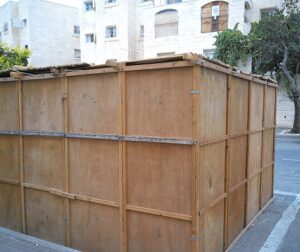
26.Being very careful with the sukkah mitzvah is a segulah so that quarrels do not occur in your home throughout the year [36]. Likewise, it is a segulah to end arguments, to study the Sukkah treaty[37].
27.For those who are careful to eat “matzah shemurah” on Seder night and not regular matzah, they should keep a piece of this matzah at home throughout the year, and this is a segulah for peace at home[38].
29. Reciting Bircat Hamazon (Grace after meals) with concentration – besides being a segulah for sustenance, it is also a segulah for the peace at home[40].
30.Segulah for the peace at home of Rabbi Asher Fraund ZTL: that the utensil used for ritual washing of hands before eating bread must be made of metal, out of respect for the mitzvah[41].
31.Keeping Tseniut (modesty and holiness) and being careful not to look at anything inappropriate – this is all a great segulah for peace[42]. Likewise, it is a proven segulah for keeping the Shechinah at home and for Shalom Bait that the wife is careful to cover her head in such a way that not a bit of her hair is revealed[43] (and even more so that She doesn’t wear a wig but a scarf).
32.Our sages say: “If you kept your mouth away from Lashon Hará, all your days will be peaceful”[44].
33.On the first day of the month of Av, which is the day of Aharon Hacohen’s death, light a candle in memory of his soul, and donate an amount to charity in his honor. After this, pray to G-d with all your heart to give you peace in your home “through the merit of Aharon Hacohen” who loved peace and sought it. And since it is difficult to pray at the tomb of Aharon (which is in Jordan)[45], you can pray for it in Miron, at the tomb of Hillel Hazaken[46].
34.Pray for the peace of your home at the tomb of Rabbi Yosef Zaragosi, who is buried in the field in front of the tomb of the Ribi Yehuda Bar Ilai near Safed[47].
35.Sometimes there are forces of impurity in the house that disturb the peace at home, and to nullify these forces one must read every day in chapter 119 of the Psalms the verses that begin with the letters “Shalom Habait” שלום הבית[48] (and some say that instead of the letter He they say the letter Bet, that is: “Shalom Babait” שלום בבית[49]), and then pray to G-d that for the merit of King David and thanks to the Book of Psalms, may the Shechinah be between them and may there be love, peace and joy between them. For the benefit of readers, here are the verses:
שָׂרִים רְדָפוּנִי חִנָּם (ומדבריך) וּמִדְּבָרְךָ פָּחַד לִבִּי: שָׂ שׂ אָנֹכִי עַל אִמְרָתֶךָ כְּמוֹצֵא שָׁלָל רָב: שֶׁקֶר שָׂנֵאתִי ו ַאֲתַעֵבָה תּוֹרָתְךָ אָהָבְתִּי: שֶׁבַע בַּיּוֹם הִלַּלְתִּיךָ עַ ל מִשְׁפְּטֵי צִדְקֶךָ: שָׁלוֹם רָב לְאֹהֲבֵי תוֹרָתֶךָ וְאֵין לָמו ֹ מִכְשׁוֹל: שִׂבַּרְתִּי לִישׁוּעָתְךָ יְהוָה וּמִצְוֹתֶיךָ עָשִׂ יתִי: שָׁמְרָה נַפְשִׁי עֵדֹתֶיךָ וָאֹהֲבֵם מְאֹד :
לְעוֹלָם יְהוָה דְּבָרְךָ נִצָּב בַּשָּׁמָיִם: לְדֹר וָדֹר אֱמוּנ ָתֶךָ כּוֹנַנְתָּ אֶרֶץ וַתַּעֲמֹד: לְמִשְׁפָּטֶיךד ם כִּי הַכֹּל עֲבָדֶיךָ: לוּלֵי תוֹרָתְךָ שַׁעֲשֻׁעָי אָז אָבַדְתִּ י בְעָנְיִי: לְעוֹלָם לֹא אֶשְׁכַּח פִּקּוּדֶיךָ כִּי בָם חִיִּיתָנ ִי: לְךָ אֲנִי הוֹשִׁיעֵנִי כִּי פִקּוּדֶיךָ דָרָשְׁתִּי: לִי קִוּוּוּ רְשָׁעִים לְאַבְּדֵנִי עֵדֹתֶיךָ אֶתְבּוֹנָן: לְכָל תִּכְלָה רָאִיתִי קֵץ רְחָבָה מִצְוָתְךָ מְאֹד:
וִיבֹאֻנִי חֲסָדֶךָ יְהוָה תְּשׁוּעָתְךָ כְּאִמְרָתֶךָ: וְאֶעֱנֶ ה חֹרְפִי דָבָר כִּי בָטַחְתִּי בִּדְבָרֶךָ: וְאַל תַּצֵּל מִפִּי דְ בַר אֱמֶת עַד מְאֹד כִּי לְמִשְׁפָּטֶךָ יִחָלְתִּי: וְאֶשְׁמְרָה תו ֹרָתְךָ תָמִיד לְעוֹלָם וָעֶד: וְאֶתְהַלְּכָה בָרְחָבָה כִּי פִקֻּ דֶיךָ דָרָשְׁתִּי: וַאֲדַבְּרָה בְעֵדֹתֶיךָ נֶגֶד מְלָכִים וְלֹא אֹא בוֹשׁ: וְאֶשְׁתַּעֲשַׁע בְּמִצְוֹתֶיךָ אֲשֶׁר אָהָבְתִּי: וְאֶשָּׂ א כַפַּי אֶל מִצְוֹתֶיךָ אֲשֶׁר אָהבְתִּי וְאָשִׂיחָה בְחֻקֶּיךָ:
מָה אָהַבְתִּי תוֹרָתֶךָ כָּל הַיּוֹם הִיא שִׂיחָתִי: מֵאֹיְבַי תְ חַכְּמֵנִי מִצְוֹתֶךָ כִּי לְעוֹלָם הִיא לִי: מִכָּל מְלַמְּדַי הִ שְׂכַּלְתִּי כִּי עֵדְוֹתֶיךָ שִׂיחָה לִֿי: מִזְּקֵנִים אֶתְבּוֹנָ ן כִּי פִקּוּדֶיךָ נָצָרְתִּי: מִכָּל אֹרַח רָע כָּלִאתִי רַגְלָי ל ְמַעַן אֶשְׁמֹר דְּבָרֶךָ: מִמִּשְׁפָּטֶיךָ לֹא סָרְתִּי כִּי אַתָ ה הוֹרֵתָנִי: מַה נִּמְלְצוּ לְחִכִּי אִמְרָתֶךָ מִדְּבַשׁ לְפִי: מִפִּקּוּדֶיךָ אֶתְבּוֹנָן עַל כֵּן שָׂנֵאתִי כָּ ל אֹרַח שָׁקֶר:
הוֹרֵנִי יְהוָה דֶּרֶךְ חֻקֶּיךָ וְאֶצְּרֶנָּה עֵקֶב: הֲבִינֵנִי וְאֶצְּרָה תוֹרָתֶךָ וְאֶשְׁמְרֶנָּה בְכָל לֵב: הַדְרִיכֵנִי בִּנְ תִיג : הָקֵם לְעַבְדְּךָ אִמְרָתֶךָ אֲשֶׁר לְיִרְאָתֶךָ: הַעֲבֵר חֶרְפָּת ִי אֲשֶׁר יָגֹרְתִּי כִּי מִשְׁפָּטֶיךָ טוֹבִים:
בַּמֶּה יְזַכֶּה נַּעַר אֶת אָרְחוֹ לִשְׁמֹר כִּדְבָרֶךָ: בְּכָל ל ִבִּי דְרַשְׁתִּיךָ אַל תַּשְׁגֵּנִי מִמִּצְוֹתֶיךָ: בְּלִבִּי צָפ ַנְתִּי אִמְרָתֶךָ לְמַעַן לֹא אֶחֱטָא לָךְ: בָּרוּךְ אַתָּה יְהוָה לַמְּדֵנִי חֻקֶּיךָ: בִּשְׂפָתַי סִפַּרְתִּי כֹּל מִשְׁפְּטֵי פִי ךָ: בְּדֶרֶךְ עֵדְוֹתֶיךָ שַׂשְׂתִּי כְּעַל כָּל הוֹן: בְּפִקֻּדֶיך ָ אָשִׂיחָה וְאַבִּיטָה אֹרְחֹתֶיךָ: בְּחֻקֹּתֶיךָ אֶשְׁתַּעֲשָׁע לֹא אֶשְׁכַּח דְּבָרֶךָ:
יָדֶיךָ עָשׂוּנִי וַיְכוֹנְנוּנִי הֲבִינֵנִי וְאֶלְמְדָה מִצְוֹת ֶיךָ: יְרֵאֶיךָ יִרְאוּנִי וְיִשְׂמָחוּ כִּי לִדְבָרְךָ יִחָלְתִּי : יָדַעְתִּי יְהוָה כִּי צֶדֶק מִשְׁפָּטֶיךָ וֶאֱמוּנָה עִנִּיתָנִ י: יְהִי נָא חַסְדְּךָ לְנַחֲמֵנִי כְּאִמְרָתְךָ לְעַבְדֶּךָ: יבֹי וּנִי רַחֲמֶיךָ וְאֶחְיֶה כִּי תוֹרָתְךָ שַׁעֲשֻׁעָי: יֵבֹשׁוּ זֵדִ ים כִּי שֶׁקֶר עִוְּתוּנִי אֲנִי אָשִׂיחַ בְּפִקּוּדֶיךָ: יָשׁוּבו ּ לִי יְרֵאֶיךָ (וידעו ) וְיֹדְעֵי עֵדֹתֶיךָ: יְהִי לִבִּי תָמִים בְּחֻקֶּיךָ לְמַעַן לֹא אֵבוֹשׁ:
תִּקְרַב רִנָּתִי לְפָנֶיךָ יְהוָה כִּדְבָרְךָ הֲבִינֵנִי: תָּבוֹ א תְּחִנָּתִי לְפָנֶיךָ כְּאִמְרָתְךָ הַצִּילֵנִי: תַּבַּעְנָה שְׂ פָתַי תְּהִלָּה כִּי תְלַמְּדֵנִי חֻקֶּיךָ: תַּעַן לְשׁוֹנִי אִמְר ָתֶךָ כִּי כָל מִצְוֹתֶיךָ צֶּדֶק: תְּהִי יָדְךָ לְעָזְרֵנִי כִּי פִ קּוּדֶיךָ בָחָרְתִּי: תָּאַבְתִּי לִישׁוּעָתְךָ יְהוָה וְתוֹרָתְך ָ שַׁעֲשֻׁעָי: תְּחִי נַפְשִׁי וּתְהַלְלֶךָּ וּמִשְׁפָּטֶךָ יַעֲזְ רֻנִי: תָּעִיתִי כְּשֶׂה אֹבֵד בַּקֵּשׁ עַבְדֶּךָ כִּי מִצְוֹתֶיךָ לֹא שָׁכָחְתִּי:
And lastly, it should also be noted that every 23rd of the month (in each Hebrew month) is a favorable day for making peace, so it is appropriate to invest more efforts on this day.
And yet, as we have introduced, one must always remember that the peace of a home is something that one must “work” for to achieve and not rely solely on security. It is said that Rabbi Yehezkel Levinstein ZTL told the bride and groom that every day they should stop and think “what did I do today for the peace of my home?”[50].
PLEASE NOTE*
Attention: You should not learn from one case to another, each case must be analyzed individually. Generally speaking, it's always best to have contact with a Rabbi in person, not just virtual contact. Note that where there is a local Rabbi("Mara Deatra"), one should ask him. The answers are under the responsibility of the rabbi who responded, and not under the responsibility of the website and/or the Head of the Institution.
Last Articles

The laws of Maaser Kesafim (the Monetary Tithe)
Summary of the Tithing laws on Financial Income (Ma’asrot, Tzedakah, etc.) How much should a person donate of their profits

The laws and customs of Passover – according to the customs of Syrian Jewry (Aram Soba)
The laws and customs of Passover – according to the customs of Syrian Jewry (Aram Soba), and in particular
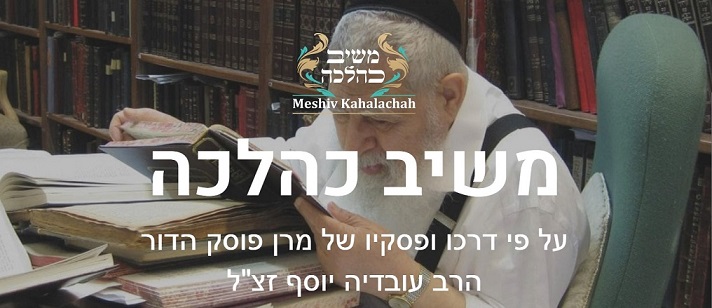
A video is presented to you regarding the segulah of the stone of the righteous, for those who wish to

The Highness of Kever Rachel – in the day of the Hilula, Cheshvan 11th (From the book Shoshani Tzion –
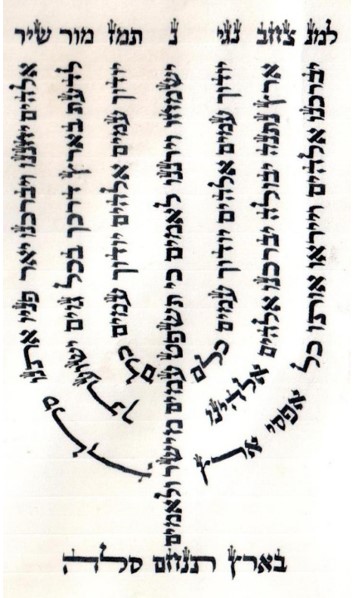
Kever Yosef Hatzadik in the city Nablus From the book Shoshanei Zion (still in manuscript) Yosef bones We are told
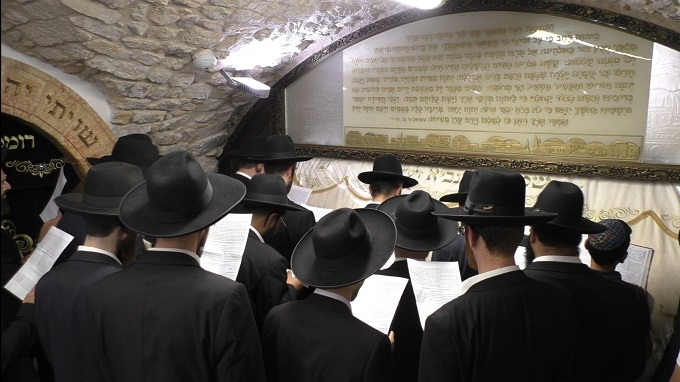
Kever Shmuel HaNavi – its Segulot and virtues
Taken from the book “Shoshanei Tzion” (still in manuscript) Kever Shmuel HaNavi is from the graves with a very ancient
You may interested
The Chief Rabbi of the Institute, together with dozens of Torah sages, will perform the Chidah’s segulah for you to raise your “Mazal” (luck, destiny), at the time of the opening of the Aron HaKodesh.
With Divine kindness, many were saved from their problems with this segulah!
Leave your details and we will return to you
